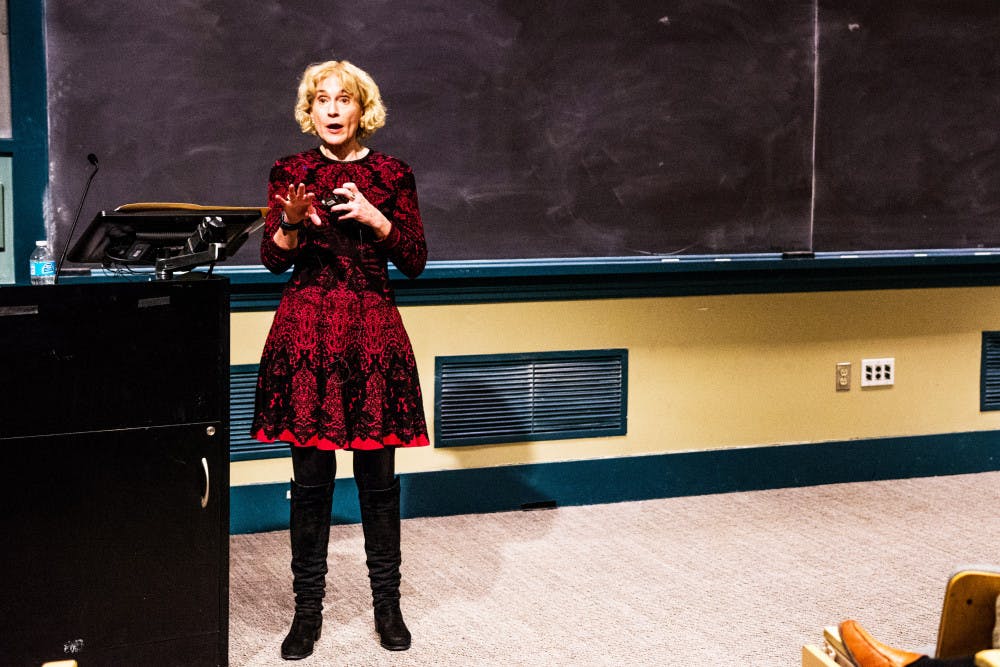Martha Nussbaum, professor of law and ethics at the University of Chicago, delivered a lecture titled “Disgust or Equality? The Struggle over Sexual Orientation Law Outside the U.S.” Monday to a crowd of nearly 100 people in the Salomon Center. The event, sponsored by the Department of Philosophy, fostered a discussion about the changing “landscape of same-sex law around the world” through the lens of the philosophy of disgust.
Nussbaum opened the lecture with a quote by Indian philosopher, educator and poet Rabindranath Tagore: “Come you outcast. Dispelled be the burden of all insults.”
She analyzed the role of disgust as the driving force in opposition to same-sex equality in the United States and India. Despite the “surface absence of disgust” from recent debates regarding homosexuality in the United States, Nussbaum said that, similar to racial segregation, the denial of rights to LGBTQ individuals is based on irrational aversion and stigmatization.
Nussbaum introduced Paul Rozin’s theory that all human beings share an acute discomfort when confronted by their own bodily fluids and decay. The discomfort with the animalistic nature of humanity is the cause of primary disgust, a form of rejection of our own “animality,” Nussbaum said.
People project their own disgust upon others by creating subgroups that act as embodiments of the animalistic qualities they find uncomfortable, she added.
This pattern can be seen throughout history, informing the stereotypes forced on Jews during the Holocaust, African-Americans in the United States and the “untouchable caste” in India, Nussbaum said. Groups marginalized by “projective disgust” are stereotyped as being “smelly” and “hypersexual,” she said. This disgust is particularly evident in the treatment and stigmatization of LGBTQ individuals in India.
“Today’s India has forgotten the joyful method of inclusion” because of the puritan ideals of chastity and purity brought with British colonization, Nussbaum said. To show how the current Indian government has been shaped by British disgust, Nussbaum described Hinduism as the religion that “most unequivocally celebrates the body and its pleasures” — especially sexuality.
As an example, Nussbaum introduced the Hijra caste, a group of individuals who do not identify as either male or female and their transition from a revered position in society to one of marginalization. By introducing to Indian society the concept that homosexuality was “against the order of nature,” colonization altered the fundamental cultural inclusivity of India, Nussbaum said.
During the question-and-answer session, Kirun Sankaran GS asked what “institutional structures there are to abate the actions of the new disgust politics” of the Hindu Right nationalists.
The Left should use arts, civil society and religion to “mobilize decent, healthy sentiments towards people,” Nussbaum said. Another solution is relying on Bollywood to confront issues of discrimination, she said, noting the success of the media in promoting the acceptance of LGBTQ people in the United States.
Despite the rampant disgust in laws and social practices, there is a “gleam of light,” Nussbaum said. In 2013, the Indian supreme court issued a ruling supporting discrimination against LGBTQ people, precipitating an increase in police violence against LGBTQ individuals, including those in the Hijra community. But a 2014 ruling established that transgender individuals should be treated under law as a third sex, entitling them to affirmative action in education and employment, Nussbaum said.
“Disgust is a powerful force in human life, and it creates tough obstacles for politics,” Nussbaum said. As a solution, she proposed following the philosophies of Walt Whitman and Tagore — raising young people without the learned behavior of disgust and thereby preventing projective disgust.
“Disgust is never a sufficient condition to make an act illegal if it causes no harm to others,” Nussbaum said.





